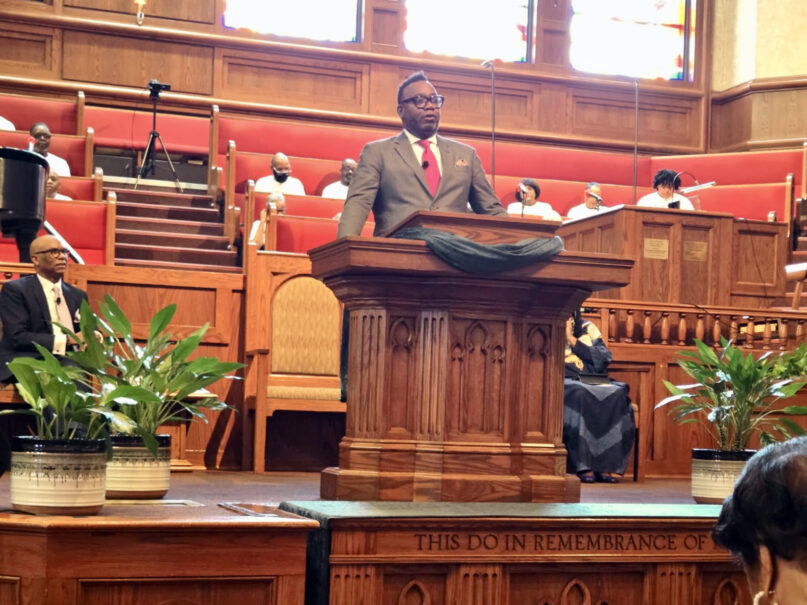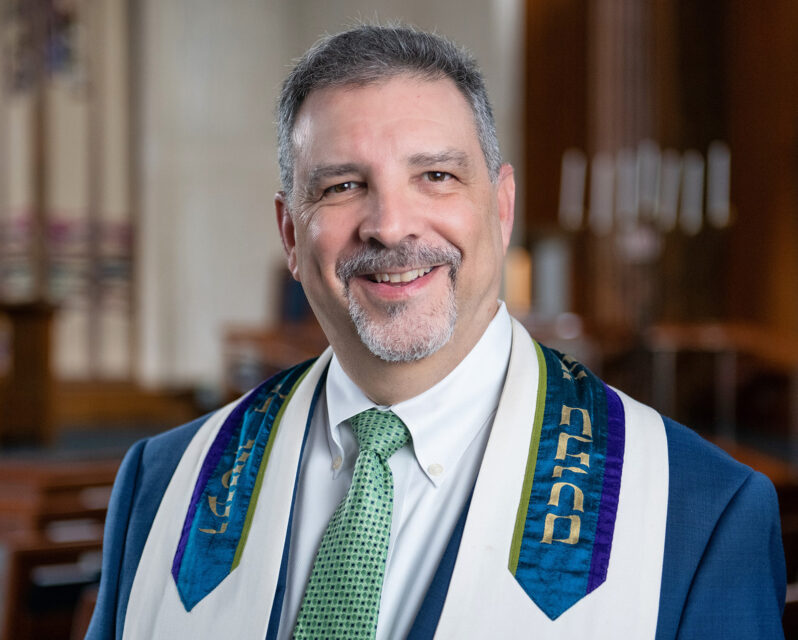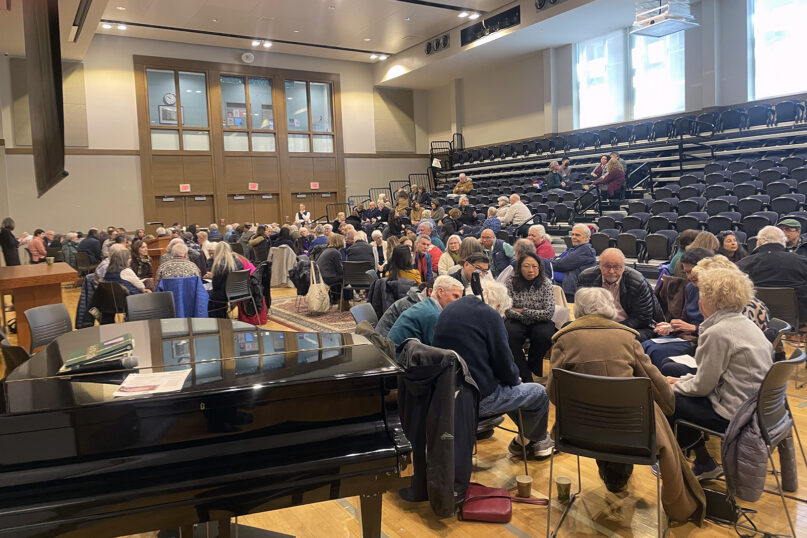(RNS) — On most mornings, Zenobia Bingham sets her alarm for 6:55 a.m. so she can join the prayer call at Washington’s Shiloh Baptist Church, where she has attended for 53 years. The call, she said, has become a chance to center herself before she contemplates the loss of another anchor of her life: a federal job.
“That daily prayer call is essential for my life,” said Bingham, who has worked for the U.S. government for four decades. The call features inspirational messages, Bible discussion and an open time when those dialing in may name prayer requests — including recent or pending loss of employment.
Bingham is pursuing a buyout offer after the General Accounting Office, where she manages information technology contractors, announced earlier this month that it’s downsizing due to expected cuts from Congress.

Zenobia Bingham. (Courtesy photo)
“It has been a great job,” Bingham said. “The benefits of raising a family and the work-life balance is amazing. And the whole remote and telework options that we’ve had, it’s been good. But it’s very stressful now.”
More than 50,000 people who worked for federal agencies, CNN recently reported, have been laid off or targeted for layoffs by the Trump administration’s Department of Government Efficiency, once headed by Elon Musk. As of June, according to The Washington Post, more than 154,000 workers from dozens of agencies took part in the deferred resignation program and will be paid through Sept. 30. Others have been fired outright.
At houses of worship across the D.C. metropolitan area, clergy and lay leaders are grappling with the loss of “the good government job,” causing ripple effects around the nation’s capital and far beyond. Most offer prayers and preaching, but some provide practical assistance by fellow congregants who have legal, job hunting or counseling expertise.
RELATED: In nation’s capital, Trump’s cuts and funding freezes spur pastoral-care crisis
The Rev. Thomas L. Bowen, interim assistant pastor at Shiloh, estimates that no less than a third of the congregation has worked in the federal government. It’s important that clergy know who is in the pews at this time, he said, but to also be prepared to respect people’s pride and desire for privacy. After the Trump cuts were initially announced, the church held a group session about new experiences with joblessness, but more recently a member who is an expert in unemployment law has held one-on-one conversations.

The Rev. Thomas L. Bowen preaches at Shiloh Baptist Church in Washington. (Courtesy photo)
“Sometimes getting people to share what they’re going through can be a struggle and so you have to allow a way for folks to keep their dignity and to reach out for help,” said Bowen, a consultant who has worked in religious affairs at the White House and D.C. government.
At the International Society for Krishna Consciousness temple in Potomac, Maryland, just north of Washington, many of the 500 congregants are government contractors from India on work visas, said temple president Ananda Vrindavan. Uncertainty, she said, is part of the job.
“You could always be asked to leave, or your contract could be up at any time, and you may not get another contract,” she said, but recently a few attendees have been offered earlier retirement with pay concluding by year’s end.

Ananda Vrindavan. (Courtesy photo)
“And they saw that as, ‘Oh, OK, Krishna’s mercy. I’m ready to do that right now,’” Vrindavan said of the recent buyouts and cuts. “So some of them felt like that was good timing for them. Others, of course, were a little more threatened by it.”
“Karuna Care,” a counseling and grief support program offered at the temple, has been instrumental in helping attendees concerned about the loss of jobs or anxious about the future of their employment. They can request one-on-one meetings with a trained volunteer counselor or gather with others in a listening circle on Sunday afternoons.
“Like a lot of cultures in the world, people very often don’t openly talk about, ‘Yeah, I got fired,’ or ‘Yes, I am struggling,’” said Vrindavan. “And so we’re finding that the kind of privacy afforded by Karuna Care is allowing people to have a place to share their anxiety over this, and at the same time, not feel so exposed.”
Temple Rodef Shalom in Falls Church, Virginia, set up a website with resources for government employees soon after the DOGE emails were sent to federal workers. Cantor Mike Shochet, the clergy liaison assisting federal workers and contractors at the Reform synagogue, estimated in an email to Religion News Service that at least 20% of his 1,800-household congregation works for the federal government; more are contractors.
For a couple of months early in the year, people with connections to the federal government met regularly, and the synagogue co-sponsored a recent workshop featuring finance, employment law and career experts with a Unitarian Universalist congregation. Shochet hopes to have more meetings after the High Holy Days.
“I’m concerned about what will happen after Sept. 30, when the ‘fork in the road’ deferred resignation program comes to an end,” said Shochet, referring to the subject line of the DOGE email many workers received announcing cuts. “Will our members need support again? That is why I expect meetings to start up in October.”

Cantor Mike Shochet at Temple Rodef Shalom in Falls Church, Va. (Photo by Lacey Ann Johnson)
What started at Holy Trinity Catholic Church in Georgetown as a single session on “Finding Peace in Troubling Times: A Gathering for Anxious Hearts,” has led to a series of workshops on job hunting. “These are very talented, accomplished people, people with doctorates from MIT and high level,” said the Rev. Kevin Gillespie, the pastor. “Their identity is shattered.”
Marie Raber, a Holy Trinity congregant and former dean of the Catholic University of America’s school of social work, led two six-week workshops, one starting in April and the other in June, for people seeking job-hunting advice, whether they were members of the church or not.
After being furloughed in January from her job implementing U.S. Agency for International Development programs at the nonprofit Democracy International, Hannah Byrd said the summer workshop led by Raber emboldened her to seize network opportunities and not be humble about constructing elevator pitches.
“It’s really important for that solidarity component and accountability in terms of motivation, when job searching for a long period of time can get isolating,” said Byrd, who is not a member of Holy Trinity. “Marie was really wonderful at encouraging us to be proud of our accomplishments, that we shouldn’t feel ashamed of our situation in terms of being unemployed, that it wasn’t our fault what happened to us.”
Byrd praised Holy Trinity’s continuing outreach, noting Rader’s plan for a third workshop in September. She said it shows that houses of worship have not forgotten that laid-off workers are still out there months after the layoffs made headlines.
“You worry: Oh, these resources are going to dry up after a while, people forget about the situation, or just people’s attention moves on,” Byrd said.

People attend the “Finding Peace in Troubling Times: A Gathering for Anxious Hearts” meeting at Holy Trinity Catholic Church on March 2, 2025, in Washington. (Photo courtesy of Holy Trinity Catholic Church)
Rader gives tips for those interviewing for jobs of lesser stature than the one they’ve had to leave. “The interviewer will say, ‘You’re overqualified for this position.’ So I’ll help them craft a response that will say, ‘Yes, I realize that, but I can bring so much more to this position.’”
While the sessions themselves may instill hope, Holy Trinity has scheduled them on Wednesday evenings, and they conclude shortly before an evening Mass. Rader invites everyone to stick around.
“Some come,” she said. “We pray, especially at that Mass, for people in the District and in the country that have lost their positions.”
RELATED: Congregations share, sacrifice during government shutdown









